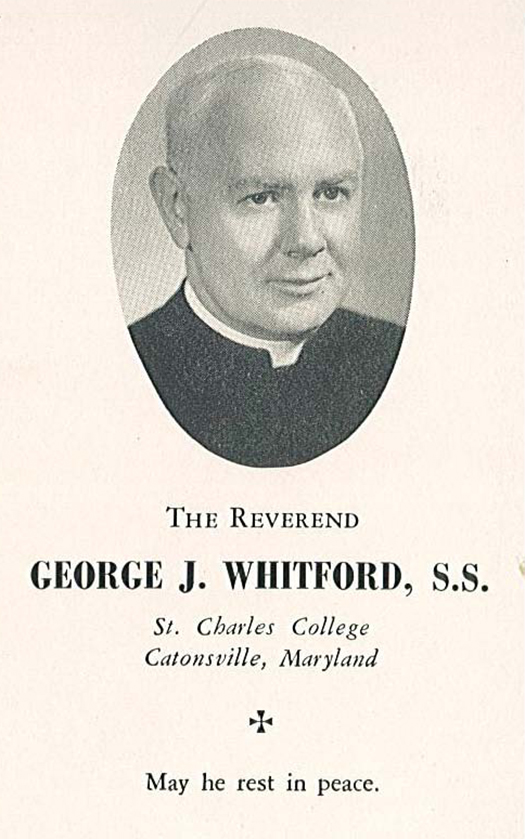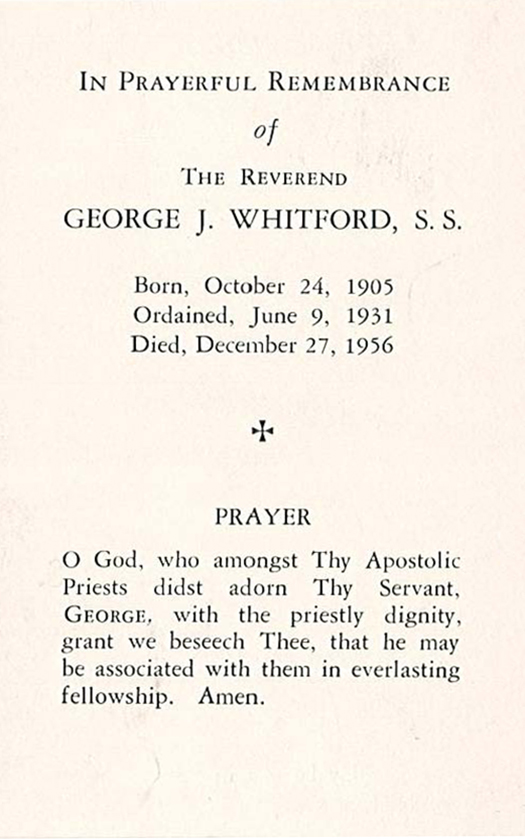Whitford, Father George
1956, December 28
Date of Birth: 1906
Paris
February 11, 1957
My dear Confreres:
Our St. Charles College in Baltimore, recently tried already by the death of Father Eugene Saupin, has lost another member of its faculty, felled by a heart attack on a busy New York street on December 28th.
To have you know something of the life and character of this confrere, I translate for you the sermon preached by Father McCormick of the seminary at the university in Washington.
“Twenty-five years ago, on June 9th, the prayers of the Roman Pontifical were recited by Bishop Shehan over George Whitford, myself, and fifty-one other young men in the crypt of the National Shrine of the Immaculate Conception in Washington. Already on that day of priestly ordination, the most beautiful of our lives, we heard the bishop delineate the length of time – longer for some, shorter for others – that would be allotted to our priesthood, and then tell us of our meeting with the Sovereign Judge. In the midst of our inexpressible joy at the thought of the powers which had been bestowed on us, we were brought to face up to the overwhelming reality of the death that would one day, sooner or later, come to call us, when we would have ‘to render an account of the duties entrusted to us.’ Those of us who knew Father Whitford well know that he always had an acute awareness of that responsibility and that he was ready, at God’s call, to render an account of his priesthood.
“A little more than fifty-one years ago, George Joseph Whitford was born of deeply religious Irish parents in New York City, where he died. With his family, he had moved out of it in his infancy.
“When he was in second year of high school, the call of God in his soul brought him to St. Charles College in Baltimore, where he was henceforth to apply himself solely to preparation for priesthood. It was then that I met him for the first time as he came into third high. His appearance breathed goodness, a loveable and smiling goodness which was to show itself in all that he said or did thereafter. Of a calm and peaceful character, he nevertheless quickly took his rank among the best in the class, thanks to the sharpness of his mind and the gifts of his intellect. At the end of his Rhetoric year he manifested a desire to dedicate his life as a Sulpician to the work of training young men for the priesthood which he thought so highly of. His Archbishop willingly gave permission.
“During seven years at Washington in the study of Philosophy and Theology, George Whitford was a serious and conscientious student (with no tension, however), and his sense of humor and his smile gave joy to his fellow students. The main impression that he made was one of solidarity and balance. His piety was simple and without affectation, like that he had experienced in his family.
“His natural goodness transformed itself more and more into that Christian charity based on love of God and of neighbor through love of God.
“After Solitude, which soon followed, Father Whitford was appointed to St. Edward’s, the seminary which had opened the previous year. With the exception of a year spent at St. Charles, he stayed at St. Edward’s until June 1937, teaching Science and acting as Librarian. On his return to the East of the United States, he first completed his studies for a Master’s degree in Science at the Catholic University in Washington. Then from 1939 until his death last week, he remained at St. Charles. There, in addition to his work as teacher, he was infirmarian up to the beginning of the present scholastic year.
“If total devotion to duty of state and careful attention to detail were the characteristics of his whole Sulpician life, these traits showed themselves especially in the service Father Whitford gave to the whole community as infirmarian. In the course of his four years at St. Edward’s and his fourteen at St. Charles, he filled this burdensome office which can – and often enough does in a house of four hundred students – take up the twenty-four hours of the day. It was in this job especially that the kindness and understanding of Father revealed themselves. Although he often had to hide his sympathy under an appearance a bit brusque in order to keep some of them from taking advantage, his kindness gave itself free rein in the scrupulous care he gave to those who really needed it. Not satisfied by sending his patients to specialists in the hospital, he sacrificed his rare moments of freedom to visit and to encourage a sick boy before and after an operation. Whenever he could be, he was present at the operation itself. Thus, for eighteen years, day after day, he carried out that extra job, indispensable in a large community, but always hidden, often forgotten. It could have become a burden without joy, carried for purely natural reasons. But, Father Whitford, with the eyes of faith, seeing in it for him God’s will, was giving an account of himself as he was giving service to young apostles, tomorrow’s priests.
“He carefully prepared his classes and his laboratory work. Having himself been conscientious in his years of study, he expected serious work from his students. His early years as a teacher had taught him that his mild and attractive demeanor demanded on his part a particularly firm manner, which he knew how to maintain as he went on.
“With his confreres he was amiable, charitable, ready to help, of jovial character, and loyal to his friends. He spared neither time nor effort to visit at various times some old or ill people.
“The spectacular had no place in his life. His simplicity, his humility, his lack of affectation felt at ease in the rather hidden life of a seminary. It was in that kind of life that he could best exercise the ministry entrusted to him. There he could use his skill in discerning true vocations. There he could show future priests, by his own life, the stability they must have in the trials that awaited them. There he could show goodness of heart, sometimes absolutely necessary. There he could give proof of the strength and courage always tied in with what is good, to what is in accord with God’s will. There he was capable of preaching, first of all, by example. In a word, by his life in the seminary, imbued with the love of God and with his devotion to the training of other Christs, he could preserve without stain the gift of his ministry; so that, after appearing before his Judge, he has, let us hope, attained Heaven to the limit of the fullness of Christ.
“Those of us who lived, worked, and prayed alongside Father George are going to feel the emptiness left by his absence. His smile, the liveliness of his looks, his humorous remarks – all these things and many others will long linger in our minds – calling up pleasant memories, renewing the thought of the loss we have undergone. We, his confreres, will miss him, his St. Charles colleagues and students even more. May the memory of one who was “wholly a priest” be for us a source of emulation urging us to be worthy of the vocation to which we have been called.
“May Father Whitford’s soul already have entered Heaven to offer there to God for all eternity the sacrifice of praise and thanksgiving.”
Again, I recommend to your prayers the soul of this confrere who so well understood our Sulpician ideal and lived it. I repeat my affectionate attachment in Our Lord and Our Lady.
P. Girard
Superior General of the Society of St. Sulpice


